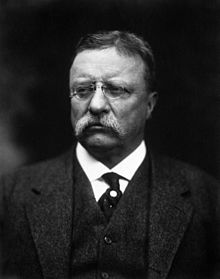
Theodore Roosevelt, also known as “Teddy” or “TR”, was the epitome of turn-of-the-century manliness. He was born in New York City, in 1858, to the wealthy, established, Roosevelt family. Theodore’s father, Theodore Sr., was the center of his family and also the center of his son’s life. Roosevelt’s father was his hero. Even after his father’s unexpected death, Roosevelt considered his father his sole role model. When he was president, he would make decisions based on what he believed his father would do.
Theodore suffered from asthma for most of his early life. When he was about eleven his father encouraged Theodore to start doing more strenuous, physical exercise. This started a pattern in Theodore’s life, of boxing, polo, hiking and other outdoorsy activities. He was also a very smart young man. He loved the natural world and became an expert on birds and animals. He entered politics in his early twenties and was elected to the New York state assembly.
After his beloved first wife, Alice, and his mother, died within hours of each other in 1884, a heart-broken Theodore left his young daughter in the care of his sister and fled westward. He settled in the Badlands of North Dakota and became a cowboy. The years he spent out west, toughened him and refreshed his soul. He returned to New York, a new man. Soon after his return he married his childhood friend Edith.
Theodore dove back into politics. He became New York City’s police commissioner. While in this position, he purged the ranks of New York’s police force, cleaning up the corruption that rode rampant in the police department. From there, he became Assistant Secretary of the Navy. At the time when Roosevelt was appointed Assistant Secretary of the Navy, America was divided over the issue of imperialism. Some Americans, like Roosevelt, advocated America’s territorial expansion. Others, like Mark Twain, believed that this was contrary to the ideals of the founding fathers. Just south of Florida, on the island of Cuba, things were getting worked up. Cuban rebels were fighting the Spanish. Roosevelt wanted the United States to invade Cuba in support of the rebels and to drive the Spanish out. He also wanted the Americans to invade the Spanish Philippines. Indeed, Theodore Roosevelt was, perhaps, the one man responsible for the Spanish-American War in 1898. He even raised his own regiment, which became known as the Rough Riders. With all the pomp and circumstance possible, Roosevelt sailed his troops from Tampa, Florida, to Cuba. Roosevelt was a firm believer in the glory and honor of war. Roosevelt led his troops to victory at San Juan Hill where he famously ordered his men, “Gentlemen, charge!”.
After the “splendid little war”, as Secretary of State John Hay put it, was over, Roosevelt returned to domestic politics. He was elected Governor of New York and later appointed Vice-President under William McKinley. His appointment to the Vice-Presidency was masterminded by the Republican machine boss, Thomas Collier Platt. Platt believed that by appointing Roosevelt to the Vice-Presidency, he would end Roosevelt’s political career forever. TR had a knack for exposing and punishing corruption and Platt wanted him done away with. Appointing him to the practically useless job of Vice-President seemed just the thing to do. Platt’s plan backfired when McKinley was assassinated by an anarchist and Roosevelt became President.
As President, Roosevelt worked to end the Russo-Japanese War. He won the Nobel Peace Prize for this work. He also devoted acres and acres of land to form national parks. He was a legendary “trust-buster” and he fought corruption in the government and big business. He also masterminded the Panama Canal and established a basis for American foreign policy in Latin America for decades to come. After Roosevelt’s presidency, he remained active. He went on expeditions in Africa and South America. When World War I broke out in 1914, TR energetically supported the Allies and campaigned for the United States’ entrance into the war.
Roosevelt died in 1919 at the age of sixty. He left a gargantuan mark on the Presidency, American politics and the United States in general. He was one of the most well-rounded men in history. His character was strong and he stood of moral principles faithfully. Roosevelt was immortalized with Abraham Lincoln, Thomas Jefferson and George Washington on the face of Mount Rushmore, South Dakota. Much more could be said about this great man, but it would take far too long to adequately describe this legendary American.
Here are some quotes from Theodore Roosevelt:
“A thorough knowledge of the Bible is worth more than a college education.”
“To educate a man in mind and not in morals is to educate a menace to society.”
“Always speak softly and carry a big stick. You will go far.”
Quotes found on brainyquote.com
